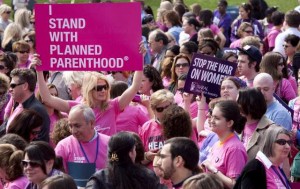 Abortion groups are fighting to make headway at the United Nations despite recent failures.
Abortion groups are fighting to make headway at the United Nations despite recent failures.
Delegates and U.N. officials have been crammed into a bustling conference room at U.N. headquarters all week during tense negotiations on a new development scheme. Abortion groups and their supporters have been campaigning for more than two years to have “reproductive rights” as a focus of the new “Sustainable Development Goals (SDG).”
The chairs expended significant efforts at the beginning of the week warning countries of time constraints. “Resist the urge of changing anything at the eleventh hour,” they asked. The latest working draft did not make any advances for abortion.
Moreover, the chairs have been adamant that where there is no consensus, they will revert to language previously agreed at the 2012 U.N. Conference on Sustainable Development. This approach does not bode well for governments that promote abortion because that conference did not even mention reproductive rights.
Fifty-eight countries delivered a statement during the negotiations asking for the inclusion of a controversial new term “sexual and reproductive health and rights.”
The new language merges the previously agreed terms “sexual and reproductive health” and “reproductive rights.” It is troubling to countries that do not allow same-sex “marriage” or abortion because the new term has never been defined and is already being used by some to advance those policies.
The World Health Organization, which promotes abortion as sexual and reproductive health, also made a pitch for the controversial new term this week.
The zero draft of the SDGs, as the document is known, is expected to be the basis for negotiations that will begin next fall. The tense negotiations are expected to continue into the early hours of Saturday before a final document is produced.
The Kenyan ambassador, who is co-chair of the negotiations, gave mixed messages about where things stand for anything controversial during negotiations. He described himself as an “agnostic” in a moment of levity, and that he would go along with whatever compromise member states could reach.
Abortion groups are lobbying aggressively for their agenda, and are especially worried of a repeat of the Millennium Development Goals, where a simple mention of “reproductive health” was not included in the scheme until 2007, and even then with much controversy.
The chairs warned non-governmental groups, who are normally not allowed in negotiations, that they could outstay their welcome after delegates last week complained that groups were aggressively lobbying them, among them were abortion groups. ”We cannot allow the bridge of trust to be broken,” the Kenyan ambassador said.
Aside from reproductive rights, one of the more contentious themes of the negotiations involves the financing of the new development goals. The largest negotiating bloc, which comprises 133 countries, is the Group of 77 or G77.
The G77 sounded the alarm on the possible collapse of the negotiations early in the week over this issue. Representatives from Bolivia and Brazil told non-governmental organizations at a specially held meeting that wealthy countries were trying to upend the whole process, scrapping more than a year and half of negotiations. The European Union held another meeting the next day denying those allegations.
If there is no agreement by Friday night, the task of preparing a proposed set of goals would likely fall to Jeffrey Sachs, who is the Secretary General’s development guru. Sachs is a known advocate for population control and rapid fertility reduction. His latest proposal on the SDGs includes these elements.
C-fam’s recent paper gives several reasons why it would be a desirable outcome for reproductive rights not to appear at all in the new development scheme.



